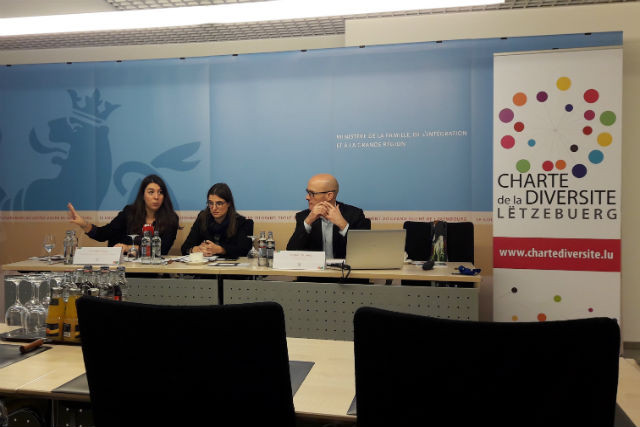In 2012, IMS (Inspiring More Sustainability) launched the Diversity Charter Lëtzebuerg to promote diversity in the workplace as a response to the country’s increasingly multi-national and diverse population. 174 companies have signed the charter so far and thereby engaged themselves to implement concrete measures to stimulate diversity and improve working conditions within their establishment.
On 11 December 2018, the IMS, represented by Catia Fernandes, together with Nicolas Poussing from Liser (Luxembourg Institute of Socio-Economic Research), and Laure Amoyel from Olai (Luxembourg Reception and Integration Agency) presented their findings from the evaluation of the surveys that are submitted by the participating organisations every two years. In 2018, 138 of 174 companies partook in the poll.
In this third edition of the “Diversity barometer,” the IMS’s statistics revealed that most companies focus their efforts on the equality of the sexes (85%), the achievement of a work life balance (80%) and a more inclusive climate in terms of languages (71%). Health conditions and the circumstances surrounding maternity are also high on the list of factors to limit discrimination against, whereas age, impairment, race and sexual orientation are ranked lower. The most prevalent motivations for signing the charter are an increase in mutual respect (45%), ethical reasons (30%) and the desire to render the work force more creative and innovative (29%).
To improve general working conditions, 92% of all participating companies adopted more flexible work hours, 89% enhanced the infrastructure of the work place and 57% assumed teleworking. Some organised events or put strategies in place to prevent burn-out and stress. More than half of the companies that joined before 2015 have noticed an increase in the employees’ well-being and an improvement of the company’s performance and image. 50% of companies also indicated that a more diverse staff also presented them with opportunities for new markets.
Another measure to further diversity is an overhaul of the recruitment process. Over 70% verified that their job descriptions for open positions were non-discriminatory and based on competences, instead of solely focusing on the CV. 67% of companies started working with structures that help marginalised people find work and 65% introduced competence-based interview training for recruiters.
Amoyel concluded that “this initiative makes diversity tangible and allows us to measure it, which is very important.” She wishes that more companies would sign the charter because “it has such a noticeable positive effect on all collaborators.” On 15 May 2019, the IMS organises the Diversity Day which seeks to inform businesses on all aspects of diversity in the workplace and during which the company with the best practices is presented with an award.
